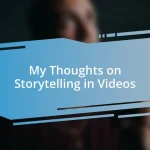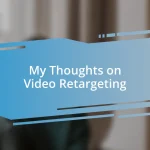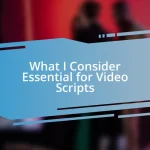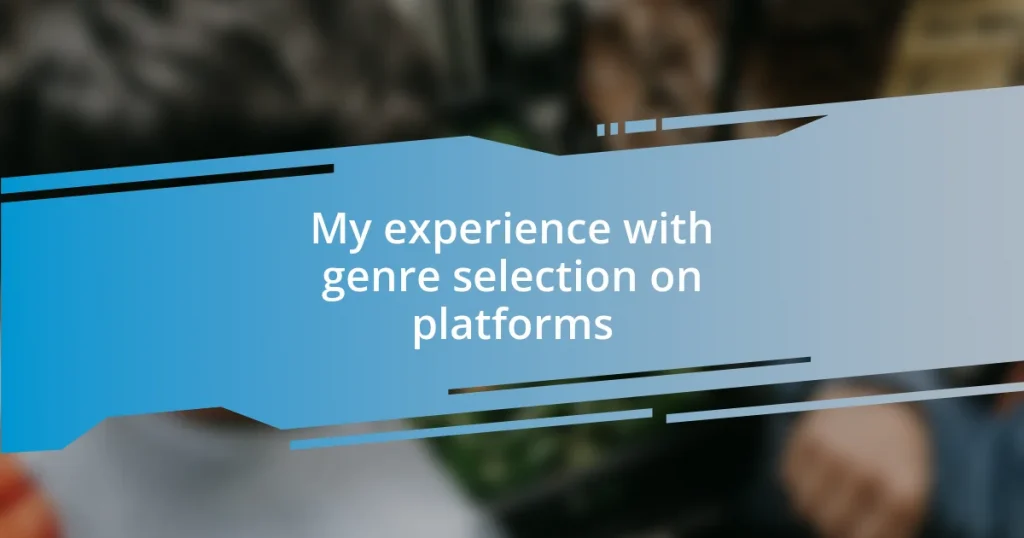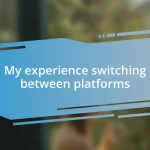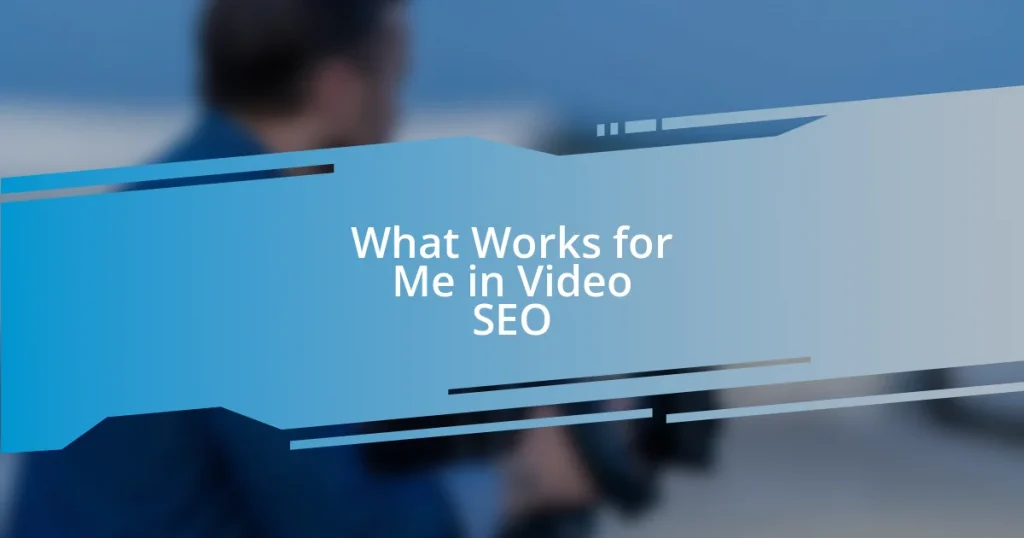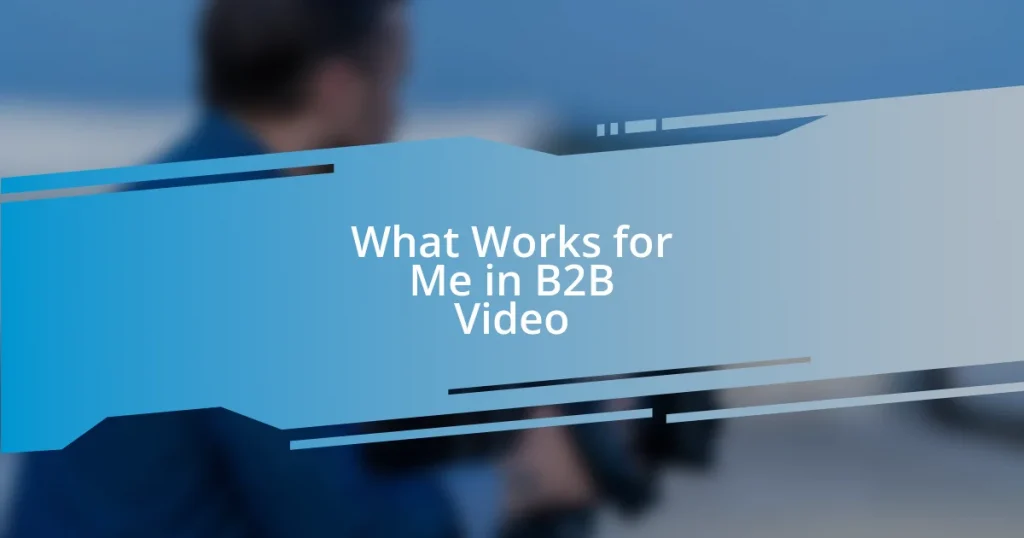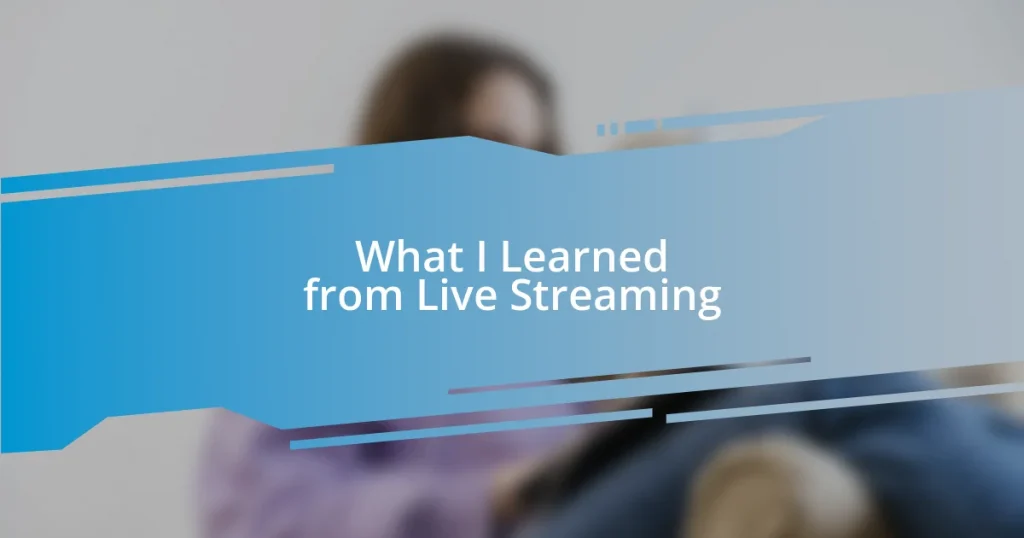Key takeaways:
- Genre selection involves trial and error, and emotional connection significantly guides the choice of genres that resonate with writers and readers alike.
- Understanding audience preferences is crucial; feedback can help refine storytelling and highlight the importance of authenticity in creating engaging narratives.
- Exploring niche genres can enhance engagement, allowing writers to connect deeply with readers through shared experiences and unique perspectives.
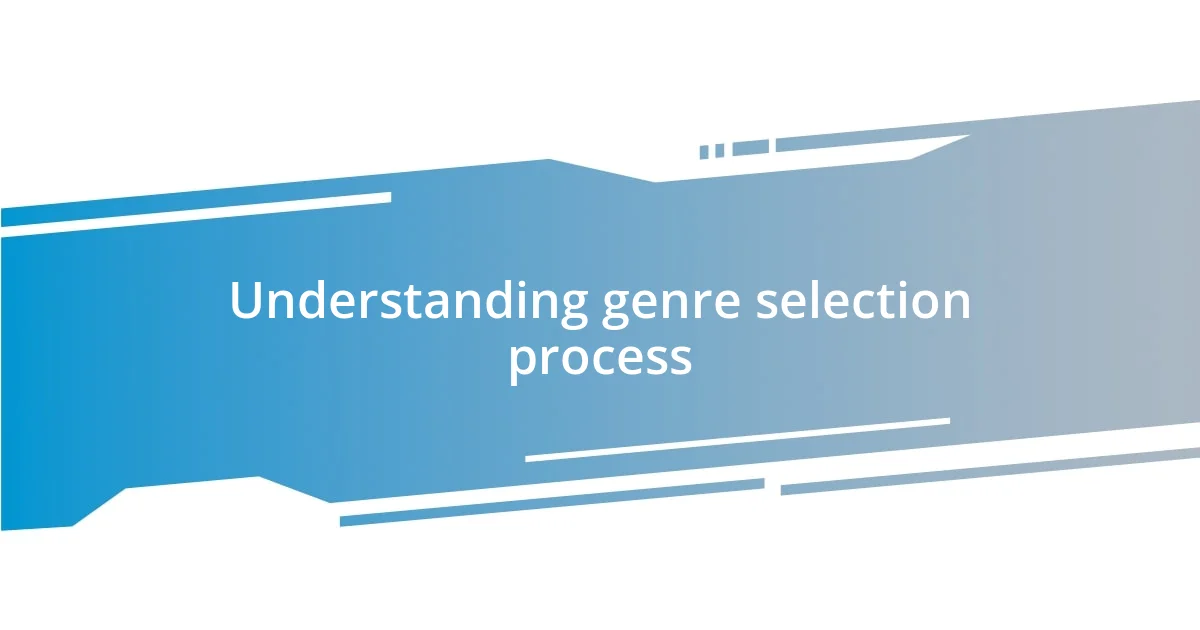
Understanding genre selection process
Choosing a genre on a platform can feel overwhelming at times. I remember when I first dabbled in writing; I flitted between genres, trying to figure out where my voice truly belonged. How do you decide which genre resonates with you? This question can be daunting, but it’s essential to reflect on your interests and experiences to find your niche.
In my experience, the genre selection process often involves trial and error. I once experimented with horror writing, only to realize it didn’t align with my true style. This taught me that it’s okay to start somewhere, even if you don’t end up staying there. Have you found yourself in a similar situation? Discovering what feels authentic is part of the journey.
As you navigate through different genres, consider how they connect with your emotions. For instance, I’ve always found comfort in fantasy writing, perhaps because it allowed me to escape reality. What genres stir something within you? Understanding your emotional triggers can significantly enhance your selection process, guiding you toward what truly excites and inspires you.
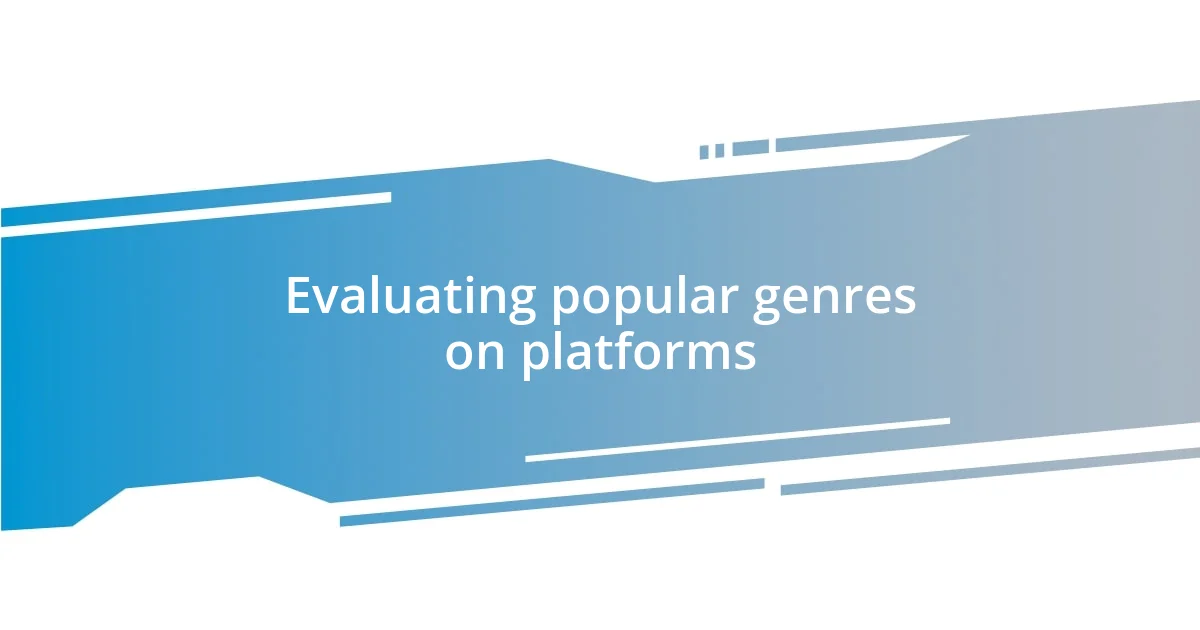
Evaluating popular genres on platforms
Evaluating popular genres on platforms can significantly shape our creative direction. After exploring various genres myself, I discovered that some resonate more with readers than others. For instance, I initially gravitated towards romance, but the feedback I received revealed that my strength lay in crafting intricate plots in the mystery genre. It’s fascinating how audience preferences can inform our paths as creators.
- Romance often captures the heart of audiences with relatable emotions.
- Mystery tends to engage readers with its puzzles and unexpected twists.
- Science fiction offers a canvas for imaginative worlds and speculative ideas.
- Non-fiction often attracts those seeking knowledge or personal development.
- Fantasy provides an escape, appealing to readers’ desire for adventure and magic.
Evaluating these genres led me to understand that the popularity of a genre can sometimes be defined by its emotional impact and the connection it fosters with readers. When I finally embraced mystery, it felt as though I had unlocked a new level in my writing journey. What has your experience been like in finding the right genre for you?
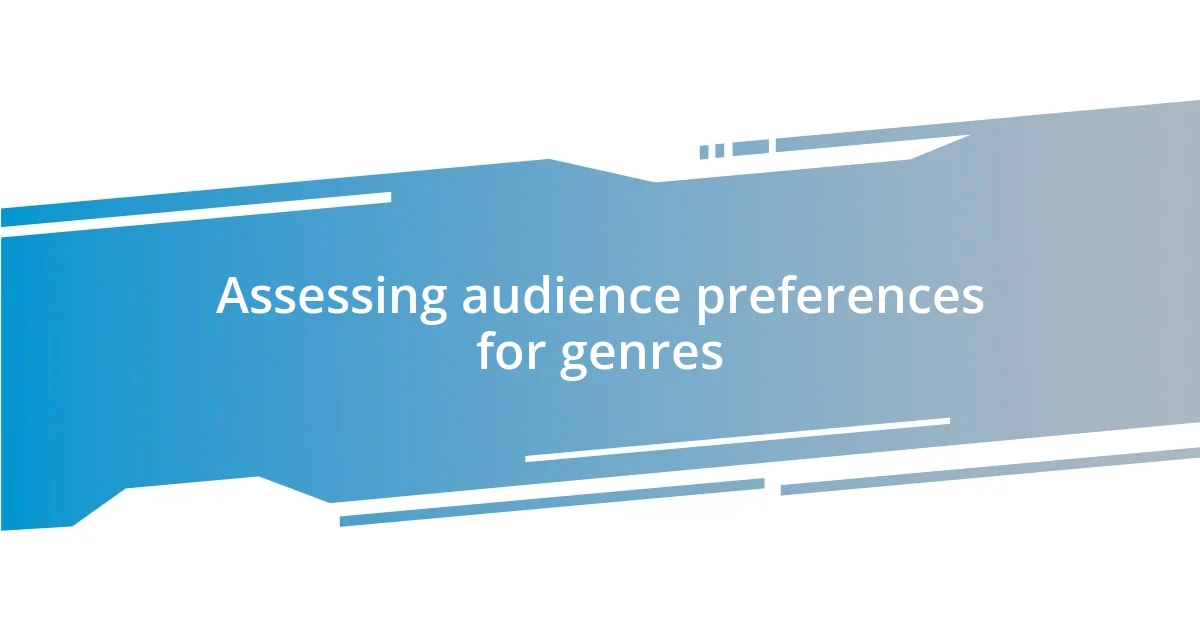
Assessing audience preferences for genres
Assessing audience preferences for genres is a crucial step in honing your craft. I recall a time when I published a short story online and eagerly awaited feedback. To my surprise, readers resonated much more with the emotional depth of my character-driven tales than the surface-level excitement of action-packed plots. This taught me the importance of tuning into my audience’s preferences and emotions, shaping the stories I choose to tell.
While working on various platforms, I noticed distinct patterns in audience engagement with different genres. For instance, when I transitioned to writing historical fiction, I initially faced mixed reactions, but once I infused personal experiences and heartfelt narratives, I received a flood of positive feedback. It became clear that readers appreciate authenticity; they crave stories that speak to their experiences. What genres do you think allow for such genuine connections?
My explorations prompted me to compare various genres based on audience engagement. This analysis revealed what truly captivates the reader. Ultimately, striking a balance between your passion and your audience’s preferences can create a more fulfilling writing experience.
| Genre | Audience Preference Insights |
|---|---|
| Romance | Relatable emotions and connections |
| Mystery | Puzzles and unexpected twists engage curiosity |
| Science Fiction | Imaginative worlds spark creativity and wonder |
| Non-fiction | Knowledge-seeking and personal growth |
| Fantasy | Adventure and magic appeal to escapism |
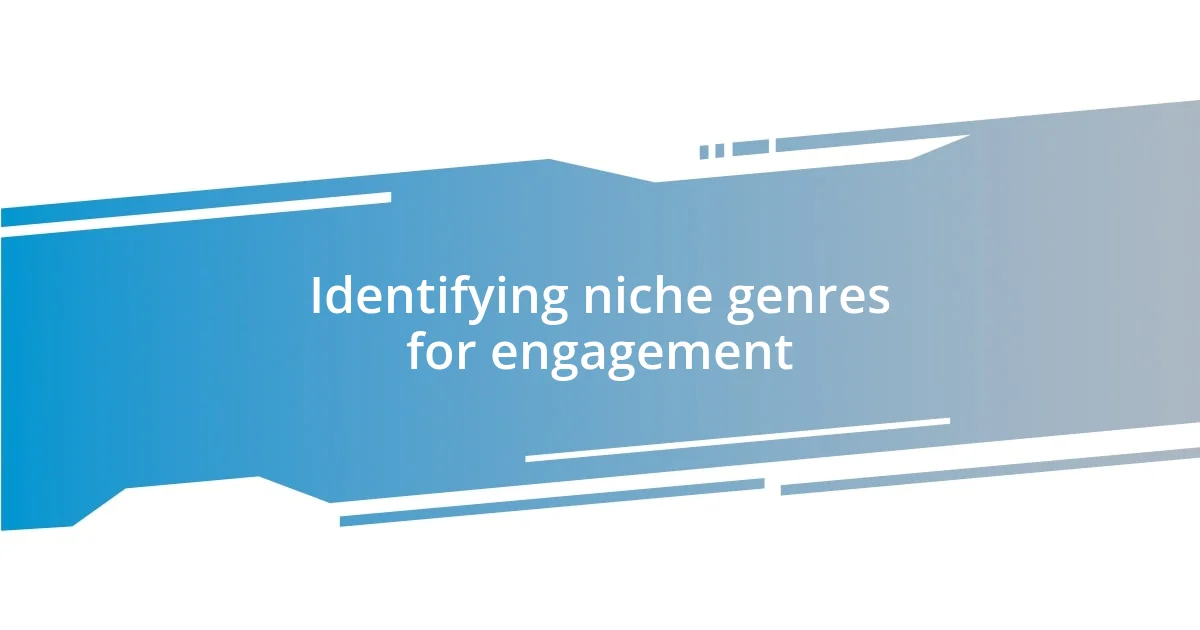
Identifying niche genres for engagement
When I started focusing on genre selection, I quickly realized how niche genres could amplify engagement. For example, while I dabbled in paranormal romance, the unique twist of intertwining real-life historical events made my stories resonate deeply with a particular audience. Have you ever discovered a niche genre that felt like a perfect fit for your voice?
In my experience, the true magic happens when you strike at the heart of a niche. I remember writing a collection of essays centered on mental health, specifically addressing the struggles of young adults. The engagement was remarkable; people started sharing their own experiences, creating a supportive community. It was this sense of belonging that illuminated for me the power of niche genres to forge deeper connections. How has a specific genre shaped your understanding of your readers?
Sometimes, the most unexpected genres can yield remarkable engagement results. I once experimented with combining culinary arts and memoir by sharing my family’s recipes alongside personal anecdotes, and it struck a chord. Readers didn’t just want to learn about cooking; they yearned for the memories and experiences tied to those dishes. This experience underscored how identifying a niche genre allows us to connect on a personal level. What insights have you gained from narrowing your focus?
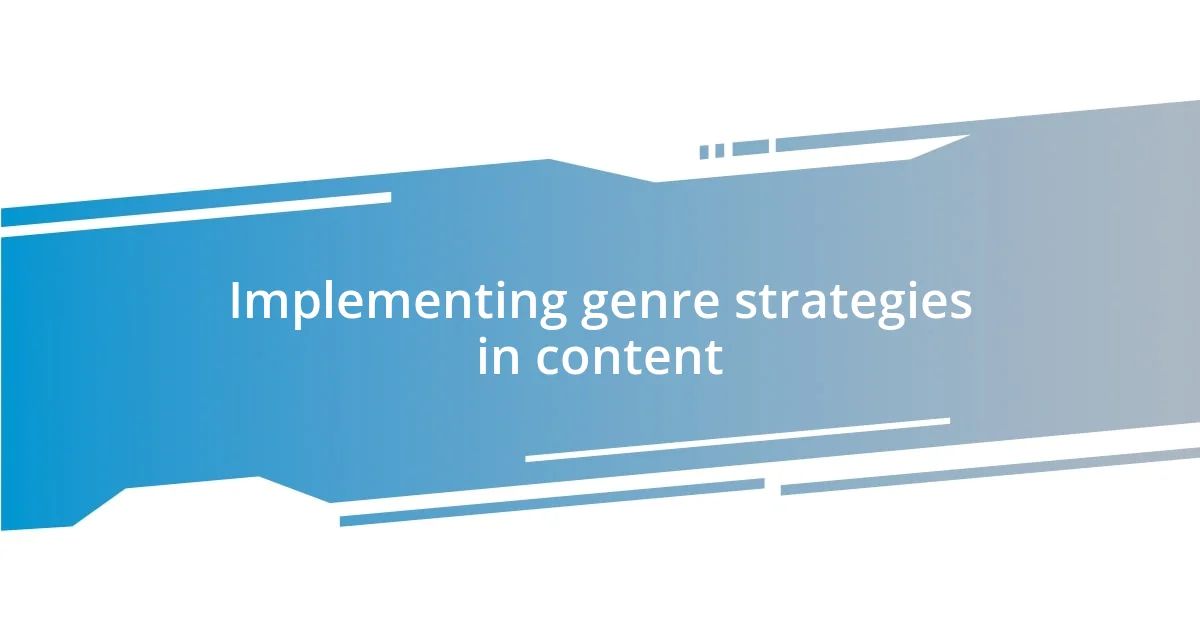
Implementing genre strategies in content
Implementing effective genre strategies in my writing often comes down to understanding the nuances that each genre offers. For instance, I discovered early on that using descriptive language in my fantasy stories not only creates immersive worlds but also fosters a sense of wonder in my readers. Have you ever thought about how the right words can transport someone to a whole new universe? I certainly have!
Another pivotal moment involved experimenting with my approach to mystery stories. I dived deep into character backstories, intertwining them with plot twists. This shift not only added layers to the narrative but also tightened the emotional grip on my audience. I remember receiving comments from readers who felt genuinely invested in the characters’ journeys, which made me realize the power of integrating character development into genre frameworks. Have you considered how your characters might enrich a particular genre’s appeal?
Finding the balance between genre conventions and my unique voice has been a rewarding challenge. When I tried my hand at writing horror, I focused not only on fear but also on relatable human experiences—like loss and regret. By blending these themes, I not only retained the genre’s essence but also connected with readers on a more profound level. How do you think blending genres could enhance your storytelling?
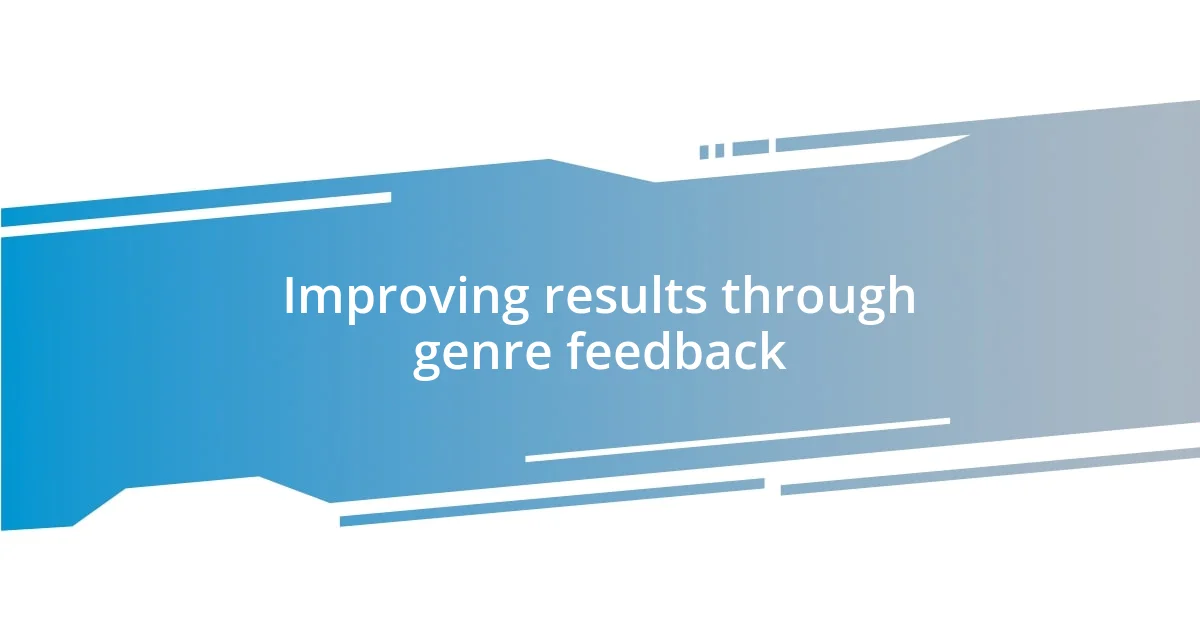
Improving results through genre feedback
In my experience, seeking feedback on genre selection has been a game changer. I remember sharing an early draft of a historical fiction piece at a writer’s group. Someone pointed out that my blend of rich historical detail and emotional moments really drew them in. It was that conversation which led me to refine my approach and even deepen the emotional stakes of my characters. Have you ever had a breakthrough moment from feedback that transformed your writing?
Receiving genre-specific feedback not only helped me improve my work but also expanded my understanding of audience expectations. When I shared my creative non-fiction essays about travel, several readers suggested focusing more on the emotional aspects of each destination. This led me to weave in personal reflections and observations, which not only enhanced the storytelling but also made my pieces resonate on a more intimate level. How has reader feedback shaped your storytelling journey?
I also found that actively participating in genre discussions can yield a wealth of insights. After joining an online forum dedicated to science fiction, I engaged with seasoned writers who shared invaluable tips on world-building and character dynamics. This communal experience enriched my own writing and introduced me to innovative ideas that I hadn’t dared to explore before. Have you ever interacted with a community that pushed your creative boundaries? The exchange of ideas can truly refine our genre choices and lead to remarkable results.






